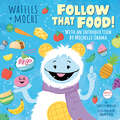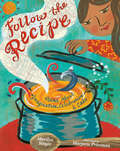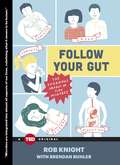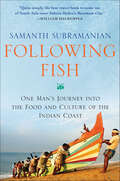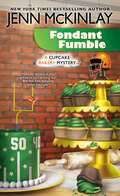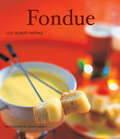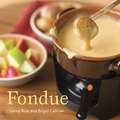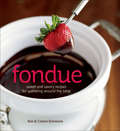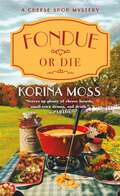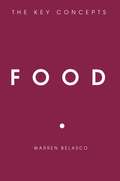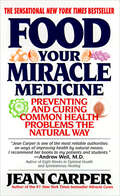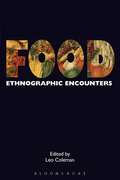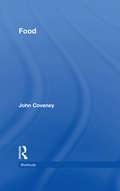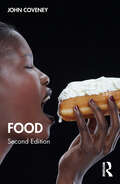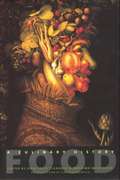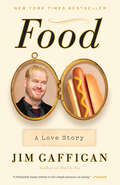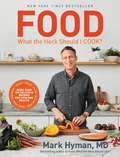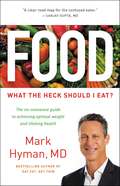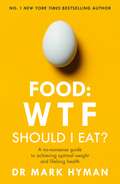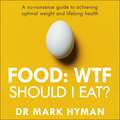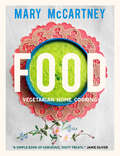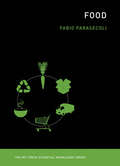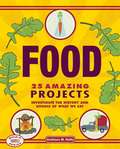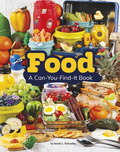- Table View
- List View
Follow That Food! (Waffles + Mochi)
by Christy WebsterWaffles + Mochi is an all-new children&’s show from President Barack and Michelle Obama&’s production company, Higher Ground Productions—coming to Netflix in March 2021! Best friends Waffles and Mochi know that delicious food brings people together. So, when they start new jobs at a supermarket, they want to make a special treat for their coworkers. But what should it be? Their search for an answer will take them around the world as they investigate ingredients, find flavors, and make new friends. Featuring a special introductory letter from Michelle Obama, this full-color, hardcover storybook is sure to please girls and boys ages 3 to 7. Join Waffles and Mochi for global adventures that reveal the stories behind our food. Produced by President Barack and Michelle Obama&’s Higher Ground Productions and streaming on Netflix, Waffles + Mochi is an entertaining mix of puppetry, animation, celebrity chefs, and famous guest stars. This delightful new show introduces young children and their families to a world of cooking and fearless eating.
Follow the Recipe: Poems About Imagination, Celebration, and Cake
by Marilyn SingerA joyful collection of poems by the author of Mirror Mirror, in the form of recipes both simple and allegorical.This delicious collection of poems by the innovative Marilyn Singer is accompanied by vibrant splashy artwork by two-time Caldecott honoree Marjorie Priceman. Presented in a small-size format to appeal to older readers (as well as young), the book has the look of a vintage collector's compendium that includes pictures, ephemera and annotations to add interest. Even young children are familiar with recipes--a series of steps to help them make something--and the book begins with simple dishes and ideas (such as a recipe for reading a recipe and a recipe for measuring), and then adds more ideas and grows in sophistication until the last recipes broach lofty concepts (such as a recipe for understanding and a recipe for peace). A treasure of words and images and ideas.
Follow Your Gut: The Enormous Impact of Tiny Microbes (TED Books #4)
by Rob Knight Brendan BuhlerAllergies, asthma, obesity, acne: these are just a few of the conditions that may be caused--and someday cured--by the microscopic life inside us. The key is to understand how this groundbreaking science influences your health, mood, and more.In just the last few years, scientists have shown how the microscopic life within our bodies-- particularly within our intestines--has an astonishing impact on our lives. Your health, mood, sleep patterns, eating preferences--even your likelihood of getting bitten by mosquitoes--can be traced in part to the tiny creatures that live on and inside of us. In Follow Your Gut, pioneering scientist Rob Knight pairs with award-winning science journalist Brendan Buhler to explain--with good humor and easy-to-grasp examples--why these new findings matter to everyone. They lead a detailed tour of the previously unseen world inside our bodies, calling out the diseases and conditions believed to be most directly impacted by them. With a practical eye toward deeper knowledge and better decisions, they also explore the known effects of antibiotics, probiotics, diet choice and even birth method on our children's lifelong health. Ultimately, this pioneering book explains how to learn about your own microbiome and take steps toward understanding and improving your health, using the latest research as a guide.
Following Fish: One Man's Journey into the Food and Culture of the Indian Coast
by Samanth SubramanianIn India's long and diverse coastline, fish inhabit the heart of many aspects of life: food of course, and also culture, commerce, sports, history, and society. Journeying along the edges of the peninsula, Samanth Subramanian delivers a kaleidoscope of extraordinary stories. Following Fish conducts rich, journalistic investigations of the use of fish to treat asthmatics in Hyderabad; of the preparation and the process of eating West Bengal's prized hilsa; of the ancient art of building fishing boats in Gujarat; of the fiery cuisine and the singular spirit of Kerala's toddy shops; of the food and the lives of Mumbai's first peoples; of the history of an old Catholic fishing community in Tamil Nadu; and of the hunt for the world's fastest fish near Goa; and of many others.Pulsating with pleasure, adventure, and discovery, Following Fish reveals a series of unknown Indias in a book as intriguing as the country itself.
Fondant Fumble (Cupcake Bakery Mystery #16)
by Jenn McKinlayThe Fairy Tale Cupcakes crew helps two professional football players in knead when the athletes are suspected of murder and their dream of opening a bakery is crushed, from New York Times bestselling author Jenn McKinlay.Professional football players Keogh Graham and Tyler Matthews want to open a Fairy Tale Cupcakes franchise. They&’re spending the off-season in Scottsdale working in Mel&’s bakery, learning about the business and how to bake show-stopping cupcakes. The popular athletes bring a boom of customers to the store as football fans flock to see the friends mixing batter and piping icing.Everyone&’s excited the athletes are pursuing their dream of owning a bakery—except for those who fear the players will ditch football for fondant and retire early from professional sports. The angry naysayers include their team owner and Keogh's sports agent, along with some very vocal fans.When the owner of their team, the Arizona Scorpions, is found dead on the floor of their new bakery following an argument with Keogh, the pros become prime suspects. As the investigation heats up, Mel and the rest of the cupcake bakery crew must step up and prove their franchise owners are innocent before it&’s game-over for the new bakers.
Fondue
by Lou Seibert PappasStir up some fun at your next gathering with this delightful collection of fondue recipes, featuring cheese fondue, entrée fondues, and dessert fondues.Whether served at festive gatherings or intimate dinners, fondue is a party dish guaranteed to deliver fabulous flavors and fun. Bestselling author Lou Seibert Pappas offers recipes that are easy to make and fabulously delicious. Traditionalists will revel in cheese fondues such as Bagna Cauda and Tuscan Cheese Fondue. Entrée options include Filet Mignon and Shrimp Fondue or Beach Lover’s Fish Pot. Best of all, the host can enjoy the time spent with family and friends, as the cooking is done right at the table. So, without ado, get ready to dip, swirl, and delight in Fondue!
Fondue: [A Cookbook]
by Lenny Rice Brigid CallinanWhether it'¬?s the first course or the entire menu, fondue is the perfect party food or casual company dinner: it provides an instant theme; the little prep needed is done well in advance; and it'¬?s guaranteed to create a leisurely, cozy atmosphere. From Northern California'¬?s wine and cheese country comes Cowgirl Creamery'¬?s head cheesemonger Lenny Rice and culinary instructor Brigid Callinan with a collection of fifty fondue recipes combining the fun of the seventies craze with the complex tastes of European tradition-all in one fondue pot. You'¬?ll find recipes for tried-and-true classics made with traditional as well as artisanal cheeses, novel spin-offs on favorite flavors like pizza and French onion soup, and chocolate and caramel desserts that will keep the tea lights burning long and bright. And should a melted pound of cheese or chocolate not be reason enough, you'¬?ll also find deliciously creative accompaniment and beverage pairing suggestions sure to inspire a return to blessedly uncomplicated and authentic fondueReviews"Anyone who already loves fondue, or who wants to dust off the old fondue pot and put it to work, needs to find a copy of this little book. It will revolutionize your fondue aspirations."-Oakland TribuneFrom the Trade Paperback edition.
Fondue: Sweet and Savory Recipes for Gathering Around the Table (Nitty Gritty Cookbooks Ser.)
by Bob Simmons Coleen SimmonsOver forty gorgeous photos and forty tempting recipes, from creamy cheese dips and decadent sweet fondues, to savory oil and broth pots.What’s not to love about that classic pairing of crusty bread dipped in a medley of melted cheeses or fresh strawberries swirled in warm, creamy chocolate? Fondue is not only a delicious and satisfying way to eat, it’s also a festive way to host company, celebrate a special occasion, or get cozy on a wintry night.The recipes in this book offer a range of fondue fare—from hearty favorites like Classic Swiss Fondue and Beef Fondue with Creamy Horseradish Sauce, to broth-based fondues like Shabu-Shabu and other Asian hot pots, which are enjoyed in stages and are ideal for dinner parties. There are also a variety of dessert fondues to satisfy any sweet tooth. You can add flair to this quick party dish with recipes for homemade dippers, or keep it simple with store-bought treats. No matter what the occasion, the recipes inside this beautifully photographed book are sure to inspire lively conversation and a great time.
Fondue or Die: A Cheese Shop Mystery (Cheese Shop Mysteries #5)
by Korina MossIn Korina Moss's Fondue or Die, the lazy, hazy, dairy days of summer are coming to a close in the Sonoma Valley. . . and so is someone’s life.The small town of Yarrow Glen’s neighbor, Lockwood, hosts an annual Labor Day weekend bash: Dairy Days. And Willa Bauer and her cheese shop, Curds & Whey, refuse to miss out on the fun. Willa is thrilled to celebrate her favorite thing—she is a cheesemonger after all—and this festival goes all out: butter sculptures, goat races, cheese wheel relays, even a Miss Dairy pageant. Too bad the pageant runner, Nadine, is treating Dairy Days prep like it’s fondue or die and is putting everyone around her on edge. When Willa finds Nadine’s dead body under years’ worth of ceramic milk jugs, the police aren’t sure whether the death was an accident. But fingers are pointing at Willa’s employee, Mrs. Schultz, who steps in to help the pageant after Nadine’s death. Someone wanted Nadine out of the whey, and Willa is going to find out who.
Food: The Key Concepts (The Key Concepts Ser.)
by Warren BelascoFood: The Key Concepts presents an exciting, coherent and interdisciplinary introduction to food studies for the beginning reader. Food Studies is an increasingly complex field, drawing on disciplines as diverse as Sociology, Anthropology and Cultural Studies at one end and Economics, Politics and Agricultural Science at the other. In order to clarify the issues, Food: The Key Concepts distills food choices down to three competing considerations: consumer identity; matters of convenience and price; and an awareness of the consequences of what is consumed. The book concludes with an examination of two very different future scenarios for feeding the world's population: the technological fix, which looks to science to provide the solution to our future food needs; and the anthropological fix, which hopes to change our expectations and behaviors. Throughout, the analysis is illustrated with lively case studies. Bulleted chapter summaries, questions and guides to further reading are also provided.
Food: Your Miracle Medicine
by Jean CarperFood -- Your Miracle Medicine is the breakthrough book on food and health for the nineties. This comprehensive guide, based on more than 10,000 scientific studies, reveals how you can use the extraordinary powers of food to prevent and alleviate such common maladies as headaches and hay fever, as well as to ward off major killers, including heart disease and cancer. Jean Carper, the bestselling author of The Food Pharmacy, has now translated the amazing new discoveries about the medical powers of food into practical advice and information that you can use every day to conquer disease, increase your mental energy, and live longer.A carrot a day could slash your risk of stroke by 70 percent.Ginger can stop migraine headaches and nausea.Half an avocado a day can dramatically improve your blood cholesterol.Brazil nut may improve your mood.Brazil nuts may improve your mood.Tea helps prevent stroke, heart disease, and cancer.A food allergy may be the cause of your fatigue.
Food: Ethnographic Encounters (Encounters: Experience and Anthropological Knowledge Series #3)
by Leo ColemanFood preparation, consumption, and exchange are eminently social practices, and experiencing another cuisine often provides our first encounter with a different culture. This volume presents fascinating essays about cooking, eating, and sharing food, by anthropologists working in many parts of the world, exploring what they learned by eating with others. <p><p> These are accounts of specific experiences - of cooking in Mombasa, shopping for organic produce in Vienna, eating vegetarian in Vietnam, raising and selling chickens in Hong Kong, and of refugees subsisting on food aid. With a special focus on the experience and challenge of ethnographic fieldwork, the essays cover a wide range of topics in food studies and anthropology, including food safety and food security, cultural diversity and globalization, colonial histories and contemporary identities, and changing ecological, social, and political relations across cultures. <p><p> Food: Ethnographic Encounters offers readers a broad view of the vibrancy of local and global food cultures, and provides an accessible introduction to both food studies and contemporary ethnography.
Food
by John CoveneyThe centrality of food in life, and the importance of food as life, is undeniable. As a source of biological substrates, personal pleasure and political power, food is and has been an enduring requirement of human biological, social and cultural existence. In recent years, interest in food has increased across the academic, public and popular spheres, fuelled by popular media’s constant play on the role of food and body size, and food and cooking, as a mass spectacle for TV audiences. In Food, a new book part of the Shortcuts Series, John Coveney examines ‘food as…’ humanness, identity, politics, industry, regulation, the environment and justice. He explores how food helps us understand what it means to be human. Through food, we construct our social identities, our families and communities, but this book also highlights the tensions between the industrialisation of food, the environment, and the fair (or otherwise) worldwide distribution of food. It considers how the food industries, on which most of us have to rely, have also had direct effects on our bodies – whether through diet and longevity, or the development of illness and diseases. This book is for all students and general readers alike – or for anyone with a fascination with food. It questions the idea that food is merely something inert on the plate, and instead shows how influential, symbolic, powerful and transformative food has come to be. This book is part of the Shortcuts series published by Routledge, a major new series of concise, accessible introductions to some of the major issues of our times.
Food (Shortcuts Ser.)
by John CoveneyIn Food, John Coveney examines ‘food as … ’ identity, politics, industry, regulation, the environment, justice and gastronomy. He explores how food helps us understand what it means to be human. The centrality of food in life, and the importance of food as life, is undeniable. As a source of biological substrates, personal pleasure and political power, food is and has been an enduring requirement of human biological, social and cultural existence. In recent years, interest in food has increased across the academic, public and popular spheres, fuelled by popular media’s constant play on the role of food and body size, and food and cooking, as a mass spectacle for TV audiences. Through food, we construct our social identities, our families and communities. However, Coveney also highlights the tensions between the industrialisation of food, the environment, and the iniquitous distribution of food. He also considers how the food industries, on which most of us must rely, have also had direct effects on our bodies through diet, and the development of illness and diseases. This accessible primer is for students and general readers alike, indeed, for anyone with an interest in food. It questions the idea that food is merely something inert on the plate. Instead, it shows how influential, symbolic, powerful and transformative food has come to be.
Food: A Culinary History (European Perspectives: A Series in Social Thought and Cultural Criticism)
by Flandrin Jean-Louis Montanari MassimoWhen did we first serve meals at regular hours? Why did we begin using individual plates and utensils to eat? When did "cuisine" become a concept and how did we come to judge food by its method of preparation, manner of consumption, and gastronomic merit?Food: A Culinary History explores culinary evolution and eating habits from prehistoric times to the present, offering surprising insights into our social and agricultural practices, religious beliefs, and most unreflected habits. The volume dispels myths such as the tale that Marco Polo brought pasta to Europe from China, that the original recipe for chocolate contained chili instead of sugar, and more. As it builds its history, the text also reveals the dietary rules of the ancient Hebrews, the contributions of Arabic cookery to European cuisine, the table etiquette of the Middle Ages, and the evolution of beverage styles in early America. It concludes with a discussion on the McDonaldization of food and growing popularity of foreign foods today.
Food: A Love Story
by Jim Gaffigan"What are my qualifications to write this book? None really. So why should you read it? Here's why: I'm a little fat. If a thin guy were to write about a love of food and eating I'd highly recommend that you do not read his book." Bacon. McDonalds. Cinnabon. Hot Pockets. Kale. Stand-up comedian and author Jim Gaffigan has made his career rhapsodizing over the most treasured dishes of the American diet ("choking on bacon is like getting murdered by your lover") and decrying the worst offenders ("kale is the early morning of foods"). Fans flocked to his New York Times bestselling book Dad is Fat to hear him riff on fatherhood but now, in his second book, he will give them what they really crave--hundreds of pages of his thoughts on all things culinary(ish). Insights such as: why he believes coconut water was invented to get people to stop drinking coconut water, why pretzel bread is #3 on his most important inventions of humankind (behind the wheel and the computer), and the answer to the age-old question "which animal is more delicious: the pig, the cow, or the bacon cheeseburger?"
Food: More than 100 Delicious Recipes--Pegan, Vegan, Paleo, Gluten-free, Dairy-free, and More--For Lifelong Health
by Mark HymanThe companion cookbook to Dr. Hyman's New York Times bestselling Food: What the Heck Should I Eat?, featuring more than 100 delicious and nutritious recipes for weight loss and lifelong health. Dr. Mark Hyman's Food: What the Heck Should I Eat? revolutionized the way we view food, busting long-held nutritional myths that have sabotaged our health and kept us away from delicious foods that are actually good for us. Now, in this companion cookbook, Dr. Hyman shares more than 100 delicious recipes to help you create a balanced diet for weight loss, longevity, and optimum health. Food is medicine, and medicine never tasted or felt so good.The recipes in Food: What the Heck Should I Cook? highlight the benefits of good fats, fresh veggies, nuts, legumes, and responsibly harvested ingredients of all kinds. Whether you follow a vegan, Paleo, Pegan, grain-free, or dairy-free diet, you'll find dozens of mouthwatering dishes, including:Mussels and Fennel in White Wine BrothGolden Cauliflower Caesar SaladHerbed Mini-Meatballs with Butternut NoodlesLemon Berry Rose Cream Cakeand many more With creative options and ideas for lifestyles and budgets of all kinds, Food: What the Heck Should I Cook? is a road map to a satisfying diet of real food that will keep you and your family fit, healthy, and happy for life.
Food: What the Heck Should I Eat?
by Mark Hyman#1 New York Times bestselling author Dr. Mark Hyman sorts through the conflicting research on food to give us the skinny on what to eat. Did you know that eating oatmeal actually isn't a healthy way to start the day? That milk doesn't build bones, and eggs aren't the devil?Even the most health conscious among us have a hard time figuring out what to eat in order to lose weight, stay fit, and improve our health. And who can blame us? When it comes to diet, there's so much changing and conflicting information flying around that it's impossible to know where to look for sound advice. And decades of misguided "common sense," food-industry lobbying, bad science, and corrupt food polices and guidelines have only deepened our crisis of nutritional confusion, leaving us overwhelmed and anxious when we head to the grocery store.Thankfully, bestselling author Dr. Mark Hyman is here to set the record straight. In Food: What the Heck Should I Eat? -- his most comprehensive book yet -- he takes a close look at every food group and explains what we've gotten wrong, revealing which foods nurture our health and which pose a threat. From grains to legumes, meat to dairy, fats to artificial sweeteners, and beyond, Dr. Hyman debunks misconceptions and breaks down the fascinating science in his signature accessible style. He also explains food's role as powerful medicine capable of reversing chronic disease and shows how our food system and policies impact the environment, the economy, social justice, and personal health, painting a holistic picture of growing, cooking, and eating food in ways that nourish our bodies and the earth while creating a healthy society. With myth-busting insights, easy-to-understand science, and delicious, wholesome recipes, Food: What the Heck Should I Eat? is a no-nonsense guide to achieving optimal weight and lifelong health.
Food: The no-nonsense guide to achieving optimal weight and lifelong health
by Mark HymanNo 1 New York Times bestselling author Dr Mark Hyman sorts through the conflicting research on food to give us the truth on what we should be eating and why. Did you know that porridge isn't actually a healthy way to start the day? That milk doesn't build bones, and eggs aren't the devil? In WTF Should I Eat? - Dr Hyman looks at every food group and explains what we've gotten wrong, revealing which foods nurture our health and which pose a threat. He also explains the crucial role food plays in functional medicine and how food systems and policies affect our environmental and personal health.With myth-busting insights, easy-to-understand science, and delicious, wholesome recipes in every chapter, WTF Should I Eat? is an invaluable resource for cooking, eating and living well.'Dr Mark Hyman's WTF Should I Eat? offers a masterpiece of truth-telling, a subversive reproach to the industrial systems that threaten our very health - and how each of us can flourish by making better food choices. This could be the most useful book you will read.' - Daniel Goleman'I find that many people are confused about what constitutes a healthy diet. Food: WTF Should I Eat? is an easy to follow guide to the foods that harm us and the foods that heal us. If you want to take all of the guesswork out of eating a real, whole foods diet, read this book! - Dr Rangan Chatterjee
Food: The no-nonsense guide to achieving optimal weight and lifelong health
by Mark HymanNo 1 New York Times bestselling author Dr Mark Hyman sorts through the conflicting research on food to give us the truth on what we should be eating and why. Did you know that porridge isn't actually a healthy way to start the day? That milk doesn't build bones, and eggs aren't the devil? In WTF Should I eat? - Dr Hyman looks at every food group and explains what we've gotten wrong, revealing which foods nurture our health and which pose a threat. He also explains the crucial role food plays in functional medicine and how food systems and policies affect our environmental and personal health.With myth-busting insights, easy-to-understand science, and delicious, wholesome recipes in every chapter, WTF Should I Eat? is an invaluable resource for cooking, eating and living well.(P)2018 Hachette Audio
Food: Vegetarian Home Cooking
by Mary McCartneyWith Food, photographer Mary McCartney brings us easy, family-friendly meat-free dishes that will appeal to everyone—including carnivores. And theyre all presented in gorgeous pictures taken by Mary herself, along with personal stories and photos old and new.Inspired by her mothers recipes, McCartney has whipped up creative, comforting, uncomplicated, and delicious meals that will encourage home cooks to think vegetarian. They range from savory Asparagus Summer Tart and a no-meat Shepherds Pie to family favorites, including Lemon Drizzle Cake and Artys Chocolate Chip Cookies. This is good, wholesome fare, cooked well and with ease, meant for family and friends to share. And Marys unique bold and beautifully illuminated images are as irresistible as her food.
Food: A Culinary History
by Massimo Montanari Albert Sonnenfeld Jean-Louis FlandrinWhen did we first serve meals at regular hours? Why did we begin using individual plates and utensils to eat? When did "cuisine" become a concept and how did we come to judge food by its method of preparation, manner of consumption, and gastronomic merit?Food: A Culinary History explores culinary evolution and eating habits from prehistoric times to the present, offering surprising insights into our social and agricultural practices, religious beliefs, and most unreflected habits. The volume dispels myths such as the tale that Marco Polo brought pasta to Europe from China, that the original recipe for chocolate contained chili instead of sugar, and more. As it builds its history, the text also reveals the dietary rules of the ancient Hebrews, the contributions of Arabic cookery to European cuisine, the table etiquette of the Middle Ages, and the evolution of beverage styles in early America. It concludes with a discussion on the McDonaldization of food and growing popularity of foreign foods today.
Food (The MIT Press Essential Knowledge Series)
by Fabio ParasecoliA consumer's guide to the food system, from local to global: our part as citizens in the interconnected networks, institutions, and organizations that enable our food choices. Everybody eats. We may even consider ourselves experts on the topic, or at least Instagram experts. But are we aware that the shrimp in our freezer may be farmed and frozen in Vietnam, the grapes in our fruit bowl shipped from Chile, and the coffee in our coffee maker grown in Nicaragua, roasted in Germany, and distributed in Canada? Whether we know it or not, every time we shop for food, cook, and eat, we connect ourselves to complex supply networks, institutions, and organizations that enable our food choices. Even locavores may not know the whole story of the produce they buy at the farmers market. In this volume in the MIT Press Essential Knowledge series, food writer and scholar Fabio Parasecoli offers a consumer's guide to the food system, from local to global.Parasecoli describes a system made up of open-ended, shifting, and unstable networks rather than well-defined chains; considers healthy food and the contradictory advice about it consumers receive; discusses food waste and the implications for sustainability; explores food technologies (and “culinary luddism”); and examines hunger and food insecurity in both developing and developed countries. Parasecoli reminds us that we are not only consumers but also citizens, and as citizens we have more power to improve the food system than we do by our individual food choices.
Food
by Farah Rizvi Kathleen M. ReillyFrom the minute life begins, food makes you strong, helps you grow, and gives you energy. But do you take that ham sandwich for granted? You might not give a lot of thought to where your food comes from, how it got to you, what's really in it, or what it does for you. Food: 25 Amazing Projects Investigate the History and Science of What We Eat gives kids some "food for thought" as they dive into exciting projects about the incredible world of food. Kids will have fun learning about all aspects of food in our daily lives-how vegetarians balance their diet, how some cultures rose and fell based on a single food source, the route from farm to market, how eating locally makes an impact, and much more.
Food: A Can-You-Find-It Book (Can You Find It?)
by Sarah L. SchuetteFeed kids' hunger for fun, challenging puzzles with this seek-and-find title dedicated to food. To-find lists that include both pictographs and word labels task readers with finding hundreds of objects hidden in full-color photos of soups, donuts, eggs, pizza, sushi, and more.
